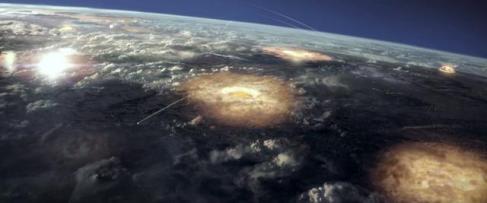Standardized testing has been coming up a lot in recent readings and discussions in my education classes. I find this fantastically well-timed, as I’m about to take my WEST-E exams in middle-level math and science. Very briefly: the WEST tests are the state of Washington’s exams, the passage of which is required as part of one’s acquisition of a teaching certification. In Washington. I’ve already passed a handful of these exams; these next ones are specifically in pursuit of my middle-school-level science and math endorsements – i.e., they’re meant to prove that I have enough math-and-science knowledge to teach these subjects to 6th-thru-8th-graders.
Standardized testing is a monstrous issue in close orbit around the current maelstrom of American education reform, and I don’t intend to get deeply into all the pros and cons here. I’ll simply state my position: that standardized testing has been given too much power to force American education in the wrong direction, and I am unsatisfied with the unthinking assumption that it is the best or most efficient method of “fixing” American education. I am also unsatisfied with the unchallenged assumption that American education is “in crisis” in a way which can be positively affected by standardized testing. Bill Ayers weighs in eloquently:
“Teachers, parents, and youngsters need to know exactly how the tests are made, who makes them and for what purposes, and who wins and who loses among test-takers. Without this knowledge, our awe of the power of test scores is a bit like the folks admiring the emperor’s new clothes – everybody else sees it, so it must be there. Armed with detailed knowledge of the process and the product, we may become like the little boy who can’t see the clothes . . .”
That’s from Ayers’ “To Teach: The Journey Of A Teacher”; Seth Godin’s “Stop Stealing Dreams” is of course also a good resource. For a more comprehensive (and perhaps less biased) list of the pros and cons of standardized testing, here’s Procon.org‘s page on it, though I warn that many of the “con” arguments are very suspect – for instance, the statement “93% of studies have found student testing, including the use of large-scale and high-stakes standardized tests, to have a ‘positive effect’ on student achievement”. What does that even mean?
Anyway, I’m looking down the barrel of not one but two standardized tests within the next three weeks. I decided to get them out of the way early. I wasn’t too worried about the math exam, as just last quarter I got a 4.0 in a college pre-calculus course – I think (and hope) that makes me safe in this case. I wanted to make sure I had my science down, though – it’s been a long time since I covered biology or chemistry, for instance, in what I’d call an “academic” setting.
So I did the logical thing: I bought an expensive test-prep book. My poison of choice was “WEST-E SECRETS: Middle Level Science (013)”, prepared by Mometrix Media LLC, which I now assume is a subsidiary of the Galactic Empire from Star Wars, or some similar organization. Actually, no – I’m sure a product endorsed by Emperor Palpatine would probably be more devious in its method for crushing wills, rather than doing so merely by an accident of stupidity.
Let me explain what I mean with two selections from the practice test near the back of the book.
“18. Which of the following is NOT an example of one of Newton’s laws of motion at work? a) Once in orbit, a satellite will continue moving around the earth. b) It takes three times as much force to move a block that has twice the mass of another. c) A ball rolling across the floor will continue moving across the floor. d) When a shotgun is fired, the gun moves sharply in the opposite direction of the bullet.”
Now, according to the answer-key, the correct answer is B, and a quick calculation shows that if Force = Mass * Acceleration (Newton’s 2nd Law), and I have a block weighing 1kg, I would need a force of 1 Newton to move that block at an acceleration of 1m/s/s. If I then had a block weighing 2kg, I would need 2 Newtons of force to move the block at the same acceleration. Here’s the problem: the only information the answer gives is that I have to move the heavier block. It doesn’t specify a desired acceleration. The 2kg block will still move when 1 Newton is applied – at 0.5m/s/s acceleration. Basically, the statement in B could be true, if a desired acceleration were given – but as it’s written, it could certainly be false.
Compare that with answer A, which the book says is in fact an example of Newton’s laws – the answer key explains that we’re looking at Newton’s 1st Law here – “An object that is at rest will stay at rest unless an external (unbalanced) force acts upon it. An object that is in motion will not change its velocity unless an external (unbalanced) force acts upon it.” Notice that I emboldened velocity. I did this because a satellite in orbit around the Earth is constantly changing its velocity – that, in a way, is what distinguishes an “orbit”, when you’re talking about the trajectories of objects in space. One object is circling around another, constantly being attracted by the orbited object’s gravitational pull – i.e., constantly being acted upon by an outside force, which stops it from hurtling off into deep space. The satellite’s speed may not change – well, not significantly, and not if it’s in a near-perfect circular orbit as opposed to an ellipse, and not if it’s in a high enough orbit to avoid friction with the Earth’s upper atmosphere – are you beginning to see why I began to feel, as I stared dumbfounded at this question, that answer A seemed the least perfect picture of one of Newton’s laws, and therefore must be the correct answer to this question?
Here’s one more example, and then I’ll get out of your hair.
“17. Which of the following properties of a meteorite moving through the planet’s atmosphere would change as it approached the surface of the Earth? a) mass b) volume c) density d) weight”
The book’s answer: D, weight. The correct answer? All of them! As an object descends through Earth’s (or any planet’s) atmosphere, it encounters tremendous friction as it has to force its way through dense clouds of molecules which weren’t there when it was happily traipsing through the vacuum of space. This friction heats the object rapidly and to extreme temperatures; heat causes it to expand (lowering density) but also to burn away (lowering volume and mass). I’m fairly certain that the book-answer took into account only the phenomenon of the mass of the meteorite getting closer to the mass of the planet, thereby increasing the gravitational attraction between them, which is measured by weight; though by the time the rock hit the planet’s surface (if indeed it got that far), its weight would be much less than if the unaltered rock were somehow teleported straight from the vacuum of space to the surface of the planet.
If this question had been written: “As an asteroid approaches the Moon, which of its following properties will change?”, then, in my mind, D – weight – would be an acceptable answer – the Moon has no atmosphere. (Another technical point to bring up is the choice of the word “meteorite” in the original question – it’s only going to be called that by geologists who dig it out of the ground, after it hits. In space it would be an asteroid; within the atmosphere, it would be a meteor.)
***
Now, I must stress – the above questions are not actual questions from the WEST-E exams, they are questions from a test-prep book which I’m now convinced was prepared by some underground cult of reptilian humanoids bent on world domination. But nevertheless, they’ve got me worried; I’ve been bingeing on Khan Academy lectures ever since I took the practice-test and got an atrociously low score. The above questions were only the most confusing and poorly-written selections from the prep book – there were many others which I got wrong simply because it’s been perhaps 10 years since I’ve been required to remember the obscure biology and chemistry terms demanded by the test – which is the other problem with these exams, really: they’re testing one’s ability to cram, and nothing more. (This also proves to me, at least, the uselessness of the traditional treatment of topics in science: as a boot-camp of term memorization, the unconnected data easily forgotten within a year of the final exam.) So cram I must, and cram I will. Will there ever be a point in my life when I can consider myself free forevermore from cramming? Only time will tell.





